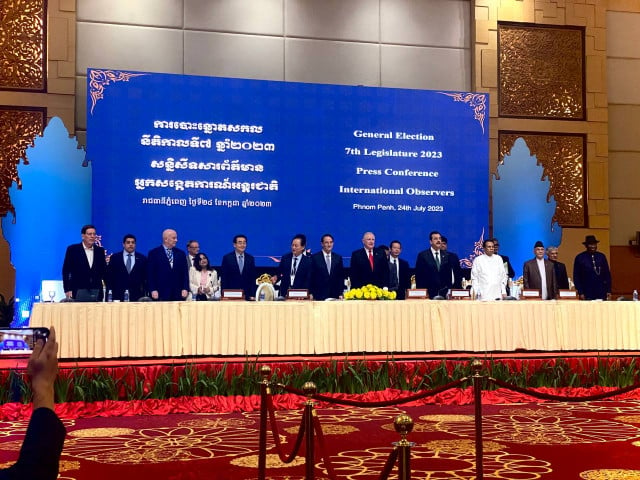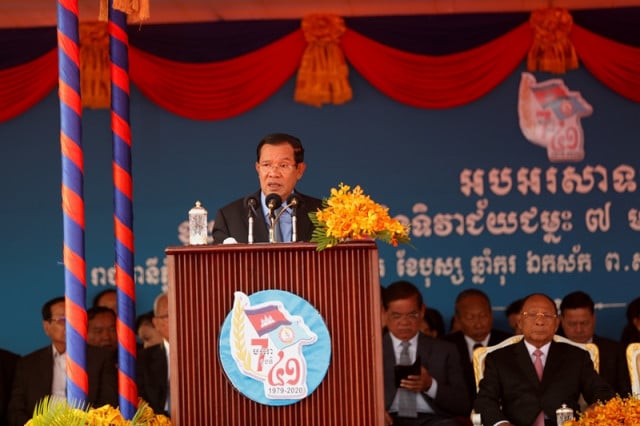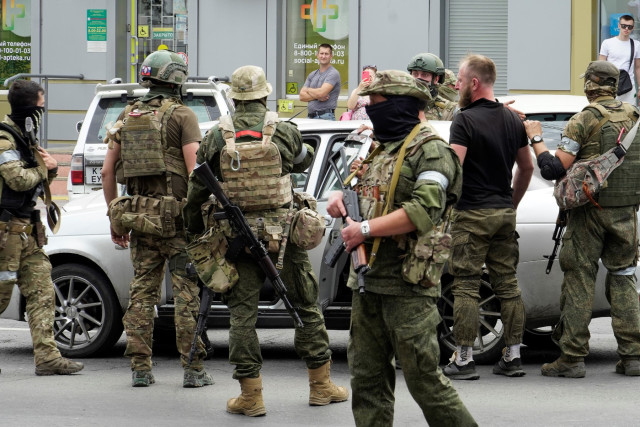Russian and Chinese Observers Praise 7th General Election’s Organization

- By Teng Yalirozy
- July 24, 2023 8:18 PM
PHNOM PENH – International observers who attended the 7th general election, including those from China and Russia, lauded the peaceful and transparent nature of the poll.
A total of 604 international observers were sent from 61 international organizations to monitor Cambodia’s election, according to a statement of the National Election Committee (NEC) on July 24, while there were 23,789 polling stations across the country. Cambodia also hosted 18 special guests from 10 institutions and provided 182 interpreters.
Qian Hongshan, vice minister of the International Department of the Communist Party of China’s Central Committee, said the political parties were free to run their campaign while the voters came ready to cast their ballots to choose their leader.
“Necessary support was provided, and privacy was highly maintained,” he said in a press conference in Phnom Penh on July 24. “The high voters’ turnout indicates the trust and values Cambodian people place in their electoral system.”
An estimated 84.58 percent of the 9.7 million registered voters, equivalent to about 8.2 million people, cast their vote, the NEC said.
As of 11 a.m. on July 24, the Cambodian People’s Party was estimated to have won 120 seats, while the royalist party Funcinpec is expected to elect five members of Parliament in the National Assembly, according to the preliminary results announced by the NEC.
The observer group from the Chinese Ministry of Foreign Affairs stated that the election process was professional and efficient. The ballot counting was conducted peacefully and orderly.
“China firmly supports Cambodian people’s choice of development path that suits Cambodia’s national condition,” the representative said during the press conference.
The delegations from the Civic Chamber of the Russian Federation Election Observation Mission (CEOM) also observed eight polling centers and 71 polling stations in Kandal province and Phnom Penh city.
The Head of Mission Andrey Maximov said no complaints were submitted during the election day and there was no sign of irregularities.
“CEOM members emphasized that the election took place in a calm atmosphere,” he said. “Overall, the CEOM concluded that the election administration was organized in a professional and efficient manner.”
Russian Ambassador to Cambodia Anatoly Borovik tweeted that Russia “welcomes the free and independent elections in Cambodia.”
“Troubling signal that undermines the democratic nature of the vote”
But, like in the 2018 elections, which were widely described as “neither free nor fair” following the dissolution of the Cambodian National Rescue Party (CNRP), the world’s leading democracies refused to send observers to assess yesterday’s polls.
For many, such a choice has been motivated by the May 15 decision of the NEC to bar the Candlelight Party from running in the election. After winning 22 percent of the votes in the 2022 communal elections, it had become CPP’s main competitor.
“Democratic elections demand open, inclusive and credible political competition and citizens to be allowed to freely choose their representatives,” said the European Union on May 15.
“This development is a troubling signal that undermines the democratic nature of the vote,” added the French Ministry of Foreign Affairs the day after.
The Japanese Embassy in Phnom Penh did not send observers either. But, in an e-mail addressed to Cambodianess on July 24, it said the Japanese government was closely watching the election situation.
“Currently, the process toward the announcement of the official results is underway, and we would like to refrain from making direct comments on the result of the election. We will continue to monitor the situation closely.”
On July 24, Australian Ambassador to Cambodia Justin Whyatt posted on Twitter that Australia “holds serious concerns […] about Cambodia’s democratic trajectory,’ underlining the “disqualification of the main opposition party” and the “pressure on independent media and civil society.”
On July 23, the U.S. Department of State said the election was “neither free nor fair” and announced it has “taken steps to impose visa restrictions on individuals who undermined democracy and implemented a pause on certain foreign assistance programs.”
As the press releases war rages on, one day after the vote, the Cambodian Ministry of Foreign Affairs and International Cooperation said in a July 24 statement that “the 2023 general election is a true reflection of Cambodia’s democratic maturity.”
NEC Spokesperson Hang Putea said the election was concluded successfully with the full participation of international and national observers.
“In the polling stations, they were actively taking notes and accumulating necessary information before making any judgments,” he said.
Despite the disqualification of the Candlelight Party, 18 different political parties were competing in the ballots. But the vast majority of them have little to no existence between two elections and don’t represent any form of credible opposition to the ruling CPP.
The NEC spent about $50 million on the organization of the election.















